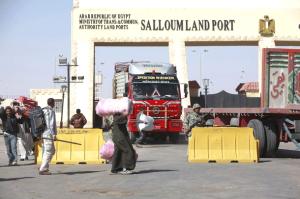MOSCOW: Russia and Iran on Wednesday said a new Russian plan had a real chance of solving the standoff over the Iranian nuclear drive, despite the failure of past initiatives to end a decade of deadlock.
Russian Foreign Minister Sergei Lavrov welcomed his Iranian counterpart Ali Akbar Salehi in Moscow to discuss the details of a "step-by-step" plan that rewards Tehran for greater transparency with a gradual easing of UN sanctions.
Salehi described the plan as a "first step" towards solving the crisis while Lavrov expressed the hope it would accelerate progress to a solution which has come to a virtual halt in recent months.
The rare visit to Moscow by Iran’s top diplomat came a day after Iranian President Mahmoud Ahmadinejad received Russian Security Council chief Nikolai Patrushev and gave his blessing to the new approach.
"The Russian proposal has good elements. It is very important," Salehi told reporters after talks with Lavrov.
"We will study all the details of this proposal. It is positive," he said, adding it would now be analyzed by "experts" in Tehran. "If one is starting on a long journey, one has to take the first step," the Iranian foreign minister said.
Lavrov said he hoped the proposal would give a push towards reviving currently frozen talks between Iran and world powers in solving the crisis.
"We expect that these topics (set out in the steps plan) will help us to move to an active phase of further work to ultimately solve this question," Lavrov said.
"I expect that this will allow us to move forward quicker than was the case until now and we can revive negotiations."
The Russian foreign minister first presented Russia’s new proposal during a July meeting in Washington with US President Barack Obama.
Crucially, Lavrov said that the Russian plan was "completely accepted" by the five other world powers involved in the attempts to find a peaceful solution to the Iranian nuclear drive.
A Russian foreign ministry source told the Kommersant business daily that while the idea has been supported by Western powers US officials in private would much prefer putting additional pressure through stronger sanctions.
World powers fear that Iran wants to develop a nuclear bomb under the cover of a civilian nuclear energy program and have for years sought to persuade Iran to renounce the key process of uranium enrichment as proof of its good will.
Iran has insisted it has every right to uranium enrichment — which can be used to make the warhead of an atomic bomb — while emphasizing that its nuclear program is entirely peaceful.
Arguing that the standoff needed to be solved through compromise, Lavrov said the aim of the Russian plan was to do "everything so that any doubts about the peaceful nature of the Iranian nuclear program are lifted."
Iran’s interest in the plan appears to mark an improvement in Tehran-Moscow relations which hit a post-Soviet low last year when Ahmadinejad warned that Russia risked becoming a "historic enemy" of the country.
Ahmadinejad has been infuriated by Russia’s refusal to fulfill a contract to deliver air defense weapons and President Dmitry Medvedev’s tougher line against the Iranian nuclear drive, which pleased Washington.
A bilateral meeting between the two presidents on the sidelines of a summit in the Kazakh capital Astana earlier this year now appears to have warmed the atmosphere.
However there have been numerous initiatives aimed at ending the standoff since the revelation of secret nuclear sites in Iran by an exiled opposition group first sparked the crisis in 2002.
Iran showed little interest in a 2008 offer drawn up by the EU that would have provided extensive Western help for its nuclear program while claims a Brazilian-Turkish initiative had solved the crisis in 2010 proved premature.


